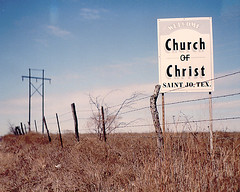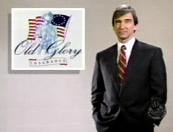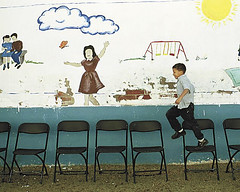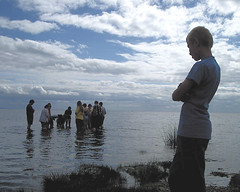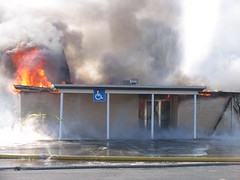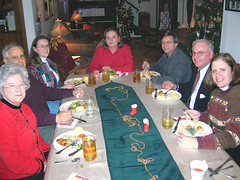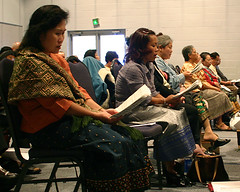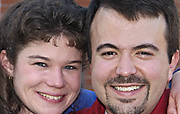(By Erik)
This lonely road sign tells travelers that the church meets in St. Jo, Texas.
I took this picture in early 2002, on the way back from a medical missions conference in Dallas.
Just before Christmas in 2001 I participated in a service project with the singles group at Memorial Road.
We ate at Cracker Barrel afterward, and I sat next to a medical school student named Jeanie Jacks. I found out she was from Altus, Okla., and that her parents worked for one of the churches there.
A few days later I was thumbing through the latest issue of the Chronicle and noticed that there was an early January gospel meeting in Altus. It was right after the medical missions conference.
As I drove north on I-35E coming back from Dallas, I debated whether or not to swing westward and stop in Altus on the way home. Going to the gospel meeting might produce a story for the paper — and it definitely would give me something to talk to Jeanie about. I exited the interstate just north of Denton.
I took the backroads and stopped along the way to photograph church signs and buildings. There were lots to choose from.
I kept telling myself that I was really doing all of this for the Chronicle — and we eventually ran some of the photos in a feature on small churches.
I drove all over Altus and couldn't find the civic center where the gospel meeting was to take place. I even stopped at the local Wal-Mart and Altus Air Force Base to ask for directions, but nobody seemed to know that Altus even had a civic center.
Finally, I gave up and went home.
I was the first person in the history of the universe to get lost in Altus, Okla. I never found the gospel meeting, but I had a funny story to tell Jeanie Jacks. I still remember her giggling uncontrollably as I told her about my little adventure. I asked her out a few weeks later.
Now, after two and a half years of marriage, I’ve driven by that civic center in Altus at least a dozen times.
Jeanie and I are planning to attend the 2006 Medical Missions Seminar in Dallas a few days from now.
It’s unlikely that we’ll drive through St. Jo, but as we pass through Denton, I'll be thinking about that little westward turn four years ago that changed my life.
Happy New Year, everybody.
Saturday, December 31, 2005
Thursday, December 22, 2005
Finally, an insurance policy we can use!
(By Erik)
As a Christmas present to faithful readers of this blog (both of you) I give you the gift of laughter.
Laughter, as you know, is the gift that keeps on giving — at least until you get tired of the joke and it’s not funny anymore.
So let it be with this offering. Follow the link to see a Saturday Night Live commercial for Old Glory Robot Insurance, featuring Sam Waterston, of Law and Order fame. He’s one of our favorite actors, and his deadpan performance makes this commercial a comedy classic.
Watch the commercial
As a Christmas present to faithful readers of this blog (both of you) I give you the gift of laughter.
Laughter, as you know, is the gift that keeps on giving — at least until you get tired of the joke and it’s not funny anymore.
So let it be with this offering. Follow the link to see a Saturday Night Live commercial for Old Glory Robot Insurance, featuring Sam Waterston, of Law and Order fame. He’s one of our favorite actors, and his deadpan performance makes this commercial a comedy classic.
Watch the commercial
Monday, December 19, 2005
PHOTO: The joy of running on chairs
(By Erik)
I took this photo in Toluca, Mexico (near Mexico City) in November 2001 during the Pan American Lectureship. Members of the Toluca Church of Christ were setting up for a fellowship meal and a young boy took the opportunity to run across a row a chairs.
Jody Jones, who was a missionary in Toluca at the time, said this was his favorite photo, although "we tell the kids not to do that!"
Click on the photo to see a larger version and some of our other photos.
I took this photo in Toluca, Mexico (near Mexico City) in November 2001 during the Pan American Lectureship. Members of the Toluca Church of Christ were setting up for a fellowship meal and a young boy took the opportunity to run across a row a chairs.
Jody Jones, who was a missionary in Toluca at the time, said this was his favorite photo, although "we tell the kids not to do that!"
Click on the photo to see a larger version and some of our other photos.
Friday, December 16, 2005
It's the end of the world as we know it (and why you should feel fine)
(By Erik)
Micah Hobbs asked me to deliver the sermon at Tealridge, a retirement community that has its own worship service on Sunday afternoons. Here's what I've put together. I'll likely have to shorten it.
When people look back on 2005 they’ll likely think of disasters.
The year began as much of the world was reeling from a killer tsunami that claimed more than 120,000 lives. Earthquakes and hurricanes followed, taking more lives and causing billions of dollars in damage. Widespread flooding has impacted India, and famine has intensified in southern Africa.
Add to that the man-made disaster of terrorism and war. Aside from the continuing conflict in Iraq, there were bomb attacks in the United Kingdom and killing in Somalia and Darfur.
Surely with everything that’s happened this year people around the globe have to be thinking about the end of the world — or so I thought. I asked all of my international contacts how they were responding to such questions from the people they serve, thinking it would make a good story for the Chronicle.
The response was underwhelming.
Only a few people wrote back, and most gave theological reasons as to why they didn’t believe that the events of 2005 were “signs of the end of days.” In churches of Christ we tend to have an aversion to talking about such matters, I believe. Also, I don’t think I did a good job of communicating the type of information I wanted for the story. (This kind of thing happens a lot when you send English-language messages around the globe.)
But Charles and Darlene Coulston’s answer was a large dose of reality for me. They’re missionaries in Nairobi, Kenya, working with a ministry called Made in the Streets. They provide orphaned children with a home, food and education.
“We have talked about the disasters with our students and prayed during chapel times — especially for Pakistan,” Charles Coulston said.
The missionaries also asked the children to break into discussion groups about the disasters. I found their responses quite sobering.
Maybe the events of 2005 did indicate that the world is ending, the former street children decided.
If so — good!
“Our kids are used to pain and loss,” Charles Coulston explained. “They look forward to the end of the world, which will be a new beginning for us all.”
There’s a lot that these orphans in Kenya could teach me about appreciating the little things in life — and staying focused on the finish line.
Christians throughout history have wondered about the end of the earth, but it seems to me that when it’s mentioned in the Bible, it’s never highlighted as “the big deal.”
The books of 1 and 2 Thessalonians are full of references to the final days. 2 Thessalonians talks in depth about “the man of lawlessness” — something I don’t even begin to understand.
But the focus of Paul’s letters to the people of Thessalonica doesn’t seem to be, “The end of the world is coming. Here’s what to look for …”
Instead, he seems to be saying, “The end of the world is coming, but don’t get caught up in it. Keep working.”
“Now, brothers and sisters, about times and dates we do not need to write to you, for you know that very well that the day of the Lord will come like a thief in the night. While people are saying, ‘Peace and safety,’ destruction will come on them suddenly, as labor pains on a pregnant woman, and they will not escape.” (1 Thessalonians 5:1-3)
Paul seems to be telling his readers to avoid getting too concerned about when the end is coming. Evidently they do get a little too caught up in it, however, and part of the reason why Paul writes 2 Thessalonians is to correct some misconceptions that arose after he wrote 1 Thessalonians.
“Concerning the coming of our Lord Jesus Christ and our being gathered to him, we ask you, brothers and sisters, not to become easily unsettled or alarmed by the teaching allegedly from us — whether by a prophecy or by world of mouth or by letter — asserting that the day of the Lord has already come.” (2 Thessalonians 2:1-2)
Instead of fretting about what might or might not be happening in the world, Paul tells us what we should do while we have the time:
“You should mind your own business and work with your hands, just as we told you, so that your daily life may win the respect of outsiders and so that you will not be dependent on anybody.” (1 Thessalonians 4:11-12)
Some Bible scholars believe that some people in the Thessalonian church had gotten so caught up in the thought that the world would end any day that they stopped working and basically were “mooching” off the church or others. Paul admonishes them not only to work, but to work with their hands. The Greeks thought that manual labor was something for slaves — it was “beneath” them.
(Typing counts as working with your hands, doesn’t it?)
In the parable of the 10 virgins, Jesus tells us, “Therefore keep watch, because you do not know the day or the hour.” (Matthew 25:13)
I think that one of the reasons I tend to get concerned about the world ending is … well … I kinda’ like it here. I have a great job, great family and a lot of stuff — nice stuff. I don’t want things to change. It’s a very different life for the street children in Kenya.
One of them, Moses Ndungu, said that the first thing he would do if the world ended would be to “run and hug Jesus.”
That’s the kind of faith I need. While I lament the evils of this world and the catastrophic death toll of 2005, I should also rejoice in the blessed assurance that this world is temporary, and there is life after this life.
Historians believe that the non-Christians in Thessalonica viewed death with horror, as evidenced by inscriptions on their tombs. Some of the early church members thought that those who died would not see Jesus, but Paul told them otherwise.
“Brothers and sisters, we do not want you to be uninformed about those who sleep in death, so that you do not grieve like the rest, who have no hope. We believe that Jesus died and rose again, and so we believe that God will bring with Jesus those who have fallen asleep in him.” (1 Thessalonians 4:13-14)
A few verses later, Paul writes:
“And so we will be with the Lord forever. Therefore encourage one another with these words.” (1 Thessalonians 4:17-18)
Micah Hobbs asked me to deliver the sermon at Tealridge, a retirement community that has its own worship service on Sunday afternoons. Here's what I've put together. I'll likely have to shorten it.
When people look back on 2005 they’ll likely think of disasters.
The year began as much of the world was reeling from a killer tsunami that claimed more than 120,000 lives. Earthquakes and hurricanes followed, taking more lives and causing billions of dollars in damage. Widespread flooding has impacted India, and famine has intensified in southern Africa.
Add to that the man-made disaster of terrorism and war. Aside from the continuing conflict in Iraq, there were bomb attacks in the United Kingdom and killing in Somalia and Darfur.
Surely with everything that’s happened this year people around the globe have to be thinking about the end of the world — or so I thought. I asked all of my international contacts how they were responding to such questions from the people they serve, thinking it would make a good story for the Chronicle.
The response was underwhelming.
Only a few people wrote back, and most gave theological reasons as to why they didn’t believe that the events of 2005 were “signs of the end of days.” In churches of Christ we tend to have an aversion to talking about such matters, I believe. Also, I don’t think I did a good job of communicating the type of information I wanted for the story. (This kind of thing happens a lot when you send English-language messages around the globe.)
But Charles and Darlene Coulston’s answer was a large dose of reality for me. They’re missionaries in Nairobi, Kenya, working with a ministry called Made in the Streets. They provide orphaned children with a home, food and education.
“We have talked about the disasters with our students and prayed during chapel times — especially for Pakistan,” Charles Coulston said.
The missionaries also asked the children to break into discussion groups about the disasters. I found their responses quite sobering.
Maybe the events of 2005 did indicate that the world is ending, the former street children decided.
If so — good!
“Our kids are used to pain and loss,” Charles Coulston explained. “They look forward to the end of the world, which will be a new beginning for us all.”
There’s a lot that these orphans in Kenya could teach me about appreciating the little things in life — and staying focused on the finish line.
Christians throughout history have wondered about the end of the earth, but it seems to me that when it’s mentioned in the Bible, it’s never highlighted as “the big deal.”
The books of 1 and 2 Thessalonians are full of references to the final days. 2 Thessalonians talks in depth about “the man of lawlessness” — something I don’t even begin to understand.
But the focus of Paul’s letters to the people of Thessalonica doesn’t seem to be, “The end of the world is coming. Here’s what to look for …”
Instead, he seems to be saying, “The end of the world is coming, but don’t get caught up in it. Keep working.”
“Now, brothers and sisters, about times and dates we do not need to write to you, for you know that very well that the day of the Lord will come like a thief in the night. While people are saying, ‘Peace and safety,’ destruction will come on them suddenly, as labor pains on a pregnant woman, and they will not escape.” (1 Thessalonians 5:1-3)
Paul seems to be telling his readers to avoid getting too concerned about when the end is coming. Evidently they do get a little too caught up in it, however, and part of the reason why Paul writes 2 Thessalonians is to correct some misconceptions that arose after he wrote 1 Thessalonians.
“Concerning the coming of our Lord Jesus Christ and our being gathered to him, we ask you, brothers and sisters, not to become easily unsettled or alarmed by the teaching allegedly from us — whether by a prophecy or by world of mouth or by letter — asserting that the day of the Lord has already come.” (2 Thessalonians 2:1-2)
Instead of fretting about what might or might not be happening in the world, Paul tells us what we should do while we have the time:
“You should mind your own business and work with your hands, just as we told you, so that your daily life may win the respect of outsiders and so that you will not be dependent on anybody.” (1 Thessalonians 4:11-12)
Some Bible scholars believe that some people in the Thessalonian church had gotten so caught up in the thought that the world would end any day that they stopped working and basically were “mooching” off the church or others. Paul admonishes them not only to work, but to work with their hands. The Greeks thought that manual labor was something for slaves — it was “beneath” them.
(Typing counts as working with your hands, doesn’t it?)
In the parable of the 10 virgins, Jesus tells us, “Therefore keep watch, because you do not know the day or the hour.” (Matthew 25:13)
I think that one of the reasons I tend to get concerned about the world ending is … well … I kinda’ like it here. I have a great job, great family and a lot of stuff — nice stuff. I don’t want things to change. It’s a very different life for the street children in Kenya.
One of them, Moses Ndungu, said that the first thing he would do if the world ended would be to “run and hug Jesus.”
That’s the kind of faith I need. While I lament the evils of this world and the catastrophic death toll of 2005, I should also rejoice in the blessed assurance that this world is temporary, and there is life after this life.
Historians believe that the non-Christians in Thessalonica viewed death with horror, as evidenced by inscriptions on their tombs. Some of the early church members thought that those who died would not see Jesus, but Paul told them otherwise.
“Brothers and sisters, we do not want you to be uninformed about those who sleep in death, so that you do not grieve like the rest, who have no hope. We believe that Jesus died and rose again, and so we believe that God will bring with Jesus those who have fallen asleep in him.” (1 Thessalonians 4:13-14)
A few verses later, Paul writes:
“And so we will be with the Lord forever. Therefore encourage one another with these words.” (1 Thessalonians 4:17-18)
Thursday, December 15, 2005
Reaction to finale of The Apprentice
(By Erik)
Jeanie and I jusst watched the grand finale of The Apprentice and we are in complete agreement that Randal is a jerk.
The only thing I'll say in his defense is that when Trump asked Randal if he should also hire Rebecca, maybe Randal thought it was some sort of test and that he would somehow lose the competition if he said yes.
We both really liked Randal — up to the very end. But we liked Rebecca too (and she's a journalist, evidently).
Of course, from what we've heard, Trump doesn't do much with the winners. One of them spent all of his time marketing Trump Water or something like that.
In general, I think that Randal was a bit over-qualified for the job. If you already have five degrees and run a multi-million-dollar business, maybe you shouldn't apply for an intership with Donald Trump.
Food for thought.
Jeanie and I jusst watched the grand finale of The Apprentice and we are in complete agreement that Randal is a jerk.
The only thing I'll say in his defense is that when Trump asked Randal if he should also hire Rebecca, maybe Randal thought it was some sort of test and that he would somehow lose the competition if he said yes.
We both really liked Randal — up to the very end. But we liked Rebecca too (and she's a journalist, evidently).
Of course, from what we've heard, Trump doesn't do much with the winners. One of them spent all of his time marketing Trump Water or something like that.
In general, I think that Randal was a bit over-qualified for the job. If you already have five degrees and run a multi-million-dollar business, maybe you shouldn't apply for an intership with Donald Trump.
Food for thought.
Wednesday, December 14, 2005
PHOTO: From a different perspective
(By Erik)
I was going through my old photos and came across this one. It's still my favorite.
To the left is a baptism that took place during a youth camp near St. Petersburg, Russia, in July 2002. Local church members and some visitors from a church in Tyler, Texas, ran the camp.
I had two cameras with me. One was my parents' old Pentax film camera. I gave that one to one of the Tyler folks who was wading into the water for the baptism. I stayed back with a small, 2 megapixel digital (it belonged to the Chronicle so I didn't want to risk getting it wet).
The guy who used my Pentax got the "typical" baptism shot. I saw this young Russian (at right) who also didn't want to wade all the way into the water, so I took a quick shot.
When the image popped up on the little LCD screen, I knew I had something good.
D'Anne Blume, one of the missionaries in St. Petersburg, said that the photo almost seemed to symbolize God looking down from heaven on the glorious rebirth of one of his children. (Those weren't her exact words, but it was three years ago!)
Sometimes an unintentional change of perspective can really help what otherwise would have looked like a typical baptism photo.
Not to say that baptism is by any means a "typical" event!
Click on the photo to view a slightly larger version if you'd like.
I was going through my old photos and came across this one. It's still my favorite.
To the left is a baptism that took place during a youth camp near St. Petersburg, Russia, in July 2002. Local church members and some visitors from a church in Tyler, Texas, ran the camp.
I had two cameras with me. One was my parents' old Pentax film camera. I gave that one to one of the Tyler folks who was wading into the water for the baptism. I stayed back with a small, 2 megapixel digital (it belonged to the Chronicle so I didn't want to risk getting it wet).
The guy who used my Pentax got the "typical" baptism shot. I saw this young Russian (at right) who also didn't want to wade all the way into the water, so I took a quick shot.
When the image popped up on the little LCD screen, I knew I had something good.
D'Anne Blume, one of the missionaries in St. Petersburg, said that the photo almost seemed to symbolize God looking down from heaven on the glorious rebirth of one of his children. (Those weren't her exact words, but it was three years ago!)
Sometimes an unintentional change of perspective can really help what otherwise would have looked like a typical baptism photo.
Not to say that baptism is by any means a "typical" event!
Click on the photo to view a slightly larger version if you'd like.
Saturday, December 10, 2005
Now take Jeanie's quiz
Jeanie's quiz is a tough one.
HINT: "JETS" stands for Junior Engineering and Technological Society.
Her husband only scored a 70 on this quiz. So, according to the world of quizzes, Erik knows as much about Jeanie as he knows about Bobby and Matt.
Yeeesh!
(Jeanie apologizes in advance if her quiz comes across as egotistical. She was trying to stump her husband. Mission accomplished.)
Take Jeanie's Quiz on QuizYourFriends.com!
See the scoreboard
HINT: "JETS" stands for Junior Engineering and Technological Society.
Her husband only scored a 70 on this quiz. So, according to the world of quizzes, Erik knows as much about Jeanie as he knows about Bobby and Matt.
Yeeesh!
(Jeanie apologizes in advance if her quiz comes across as egotistical. She was trying to stump her husband. Mission accomplished.)
Take Jeanie's Quiz on QuizYourFriends.com!
See the scoreboard
Friday, December 09, 2005
Take my quiz ... please!
(By Erik)
I stole this idea off of Matt's blog. It's pretty cool, and easy to set up.
If you feel like wasting time, follow this link and then create your own quiz (and let me and Jeanie know).
Take Erik's quiz on QuizYourFriends.com!
Or you can check the scoreboard.
I stole this idea off of Matt's blog. It's pretty cool, and easy to set up.
If you feel like wasting time, follow this link and then create your own quiz (and let me and Jeanie know).
Take Erik's quiz on QuizYourFriends.com!
Or you can check the scoreboard.
Wednesday, December 07, 2005
Church fire in Altus, Okla.
(By Erik)
Our prayers are with members of the Thomas Street Church of Christ in Altus, Okla., the church where Jeanie grew up and where we were married in June 2003.
We learned this morning that the church building was badly damaged by an early morning fire. There were no injuries reported, and the church's family life center survived. This is the church where both of Jeanie's parents work. Firefighters believe that a problem in the heating system may have started the blaze.
The good news is that everyone is fine. I just got off the phone with my mother-in-law, who informed me that the communion trays miraculously survived the fire.
Praise God for the little things.
Monday, December 05, 2005
Merry Christmas (we miss you, Ann)!
Our Connection Group had its annual Christmas dinner this evening. Jeanie and I were glad we could be there for it this year. (Last year we were on the way back from a residency program interview in Missouri.)
The food was GREAT (particularly the corn dish)! Big thanks to Dan and Jeannie Sikes for hosting the event (and to Jeannie for cooking most of the dishes). Jhansi Garnett made a really good "molten brownie" dish, too.
A few members of our group were sick and couldn't make it this year. In particular, we spent some time remembering our good friend Ann, who was a member of our group before she left for Japan. She's in a hospital in our area now, and a few folks from the group have been to see her.
You're in our prayers, Ann. We miss you! And we've got lots of leftovers if you're interested.
Try the corn dish. It's really good.
The food was GREAT (particularly the corn dish)! Big thanks to Dan and Jeannie Sikes for hosting the event (and to Jeannie for cooking most of the dishes). Jhansi Garnett made a really good "molten brownie" dish, too.
A few members of our group were sick and couldn't make it this year. In particular, we spent some time remembering our good friend Ann, who was a member of our group before she left for Japan. She's in a hospital in our area now, and a few folks from the group have been to see her.
You're in our prayers, Ann. We miss you! And we've got lots of leftovers if you're interested.
Try the corn dish. It's really good.
Saturday, December 03, 2005
How 'bout them Dawgs!
(By Erik)
My Georgia Bulldogs are going to the Sugar Bowl! They put the hurt on LSU earlier this evening, beating the third-ranked Tigers 34-14 for the SEC championship. They'll face West Virginia Jan. 2 in the Sugar Bowl. Because of Hurricane Katrina, they'll be playing once again in the Georgia Dome.
GOOOOO DAWGS! SIC' EM! WOOF WOOF!
My Georgia Bulldogs are going to the Sugar Bowl! They put the hurt on LSU earlier this evening, beating the third-ranked Tigers 34-14 for the SEC championship. They'll face West Virginia Jan. 2 in the Sugar Bowl. Because of Hurricane Katrina, they'll be playing once again in the Georgia Dome.
GOOOOO DAWGS! SIC' EM! WOOF WOOF!
Thursday, December 01, 2005
Meeting James Bond
“Do you speak Thai or Lao?”
“Neither,” I said. “I know some Spanish, but that doesn’t help much here.”
Crystal Nachampassack was understandably confused as to why a white guy would sit through an entire church service in a language he didn’t understand.
The Sunday after Thanksgiving, while Jeanie and her longtime friend Karen were worshipping in the English-language service in the auditorium, I was covering the Laotian- and Thai-language service in the fellowship hall at the South MacArthur Church of Christ in Irving, Texas.
It wasn’t the first time I worshipped with Christians in a language that was foreign to me. There always are similarities. Several of the hymns were translations of songs I know in English — including “Our God, He Is Alive” (better known to many of us as the legendary “728b”).
But the songs I really enjoyed hearing weren’t familiar to me at all. They were distinctly Asian, and the congregation seemed to sing them with more volume and emotion.
There were about 95 people in the service. A few were from Thailand, but most came to the United States from Laos, a landlocked country in Southeast Asia that became communist 30 years ago this week.
Getting here wasn’t easy. Many were put in education camps by the government. Life was hard.
Crystal swam across the Mekong River to reach the border of Thailand in the early 1980s. She was pregnant with one child and carried another on her back. Today she’s a financial adviser in the Dallas area and spends her free time helping her fellow Laotians who settled in north Texas. She held her granddaughter in her lap through the whole worship service.
I talked to a few other members of the church, including a Laotian man who came to the United States from a refugee camp in Thailand in 1979.
I asked him to spell his name — slowly. I figured it would be something like Nachampassack. He gladly obliged.
“First name: J-A-M-E-S. Last name: B-O-N-D”
“Wait a minute. You’re name is James Bond?”
“Yes.”
He changed his name when he came to the States. He wanted something short and easy to remember.
“So you picked James Bond?”
“Yes.”
I asked him if he was a fan of the films and got another “yes.”
Bond was introduced to Christianity here and said that the faith appealed to him because “it teaches us the way, how to live.” He would love to return to Laos some day, but in the meantime he’s doing what he can to spread the light to the community of Laotians living in the Dallas-Fort Worth area.
Thousands of miles from the land where they were born, they have found a faith, raised families and rebuilt their lives.
They’ve never forgotten their homeland, but they’ve carved out new homes in a new land. They love the Lord and they show by helping each other and reaching out to their communities.
Those things don’t require translation.
“Neither,” I said. “I know some Spanish, but that doesn’t help much here.”
Crystal Nachampassack was understandably confused as to why a white guy would sit through an entire church service in a language he didn’t understand.
The Sunday after Thanksgiving, while Jeanie and her longtime friend Karen were worshipping in the English-language service in the auditorium, I was covering the Laotian- and Thai-language service in the fellowship hall at the South MacArthur Church of Christ in Irving, Texas.
It wasn’t the first time I worshipped with Christians in a language that was foreign to me. There always are similarities. Several of the hymns were translations of songs I know in English — including “Our God, He Is Alive” (better known to many of us as the legendary “728b”).
But the songs I really enjoyed hearing weren’t familiar to me at all. They were distinctly Asian, and the congregation seemed to sing them with more volume and emotion.
There were about 95 people in the service. A few were from Thailand, but most came to the United States from Laos, a landlocked country in Southeast Asia that became communist 30 years ago this week.
Getting here wasn’t easy. Many were put in education camps by the government. Life was hard.
Crystal swam across the Mekong River to reach the border of Thailand in the early 1980s. She was pregnant with one child and carried another on her back. Today she’s a financial adviser in the Dallas area and spends her free time helping her fellow Laotians who settled in north Texas. She held her granddaughter in her lap through the whole worship service.
I talked to a few other members of the church, including a Laotian man who came to the United States from a refugee camp in Thailand in 1979.
I asked him to spell his name — slowly. I figured it would be something like Nachampassack. He gladly obliged.
“First name: J-A-M-E-S. Last name: B-O-N-D”
“Wait a minute. You’re name is James Bond?”
“Yes.”
He changed his name when he came to the States. He wanted something short and easy to remember.
“So you picked James Bond?”
“Yes.”
I asked him if he was a fan of the films and got another “yes.”
Bond was introduced to Christianity here and said that the faith appealed to him because “it teaches us the way, how to live.” He would love to return to Laos some day, but in the meantime he’s doing what he can to spread the light to the community of Laotians living in the Dallas-Fort Worth area.
Thousands of miles from the land where they were born, they have found a faith, raised families and rebuilt their lives.
They’ve never forgotten their homeland, but they’ve carved out new homes in a new land. They love the Lord and they show by helping each other and reaching out to their communities.
Those things don’t require translation.
Subscribe to:
Comments (Atom)

